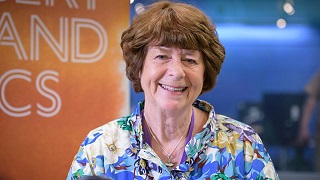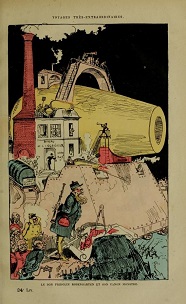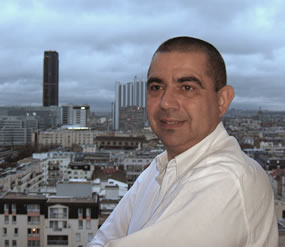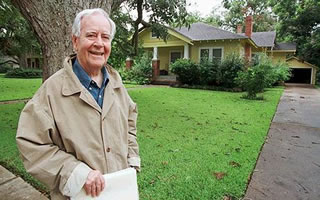De Britse dichteres van humoristische poëzie Pam Ayres werd geboren op 14 maart 1947 in Stanford in the Vale in Berkshire (tegenwoordig Oxfordshire). Zie ook alle tags voor Pam Ayres op dit blog.
You Made Me Late Again!
Well done. You’ve made me late again!
You know I’m not one to complain,
But all my careful plans have gone to pot.
Yes, you can make a face and groan,
But if I’d been on my own,
I guarantee I’d be there on the dot.
We’re in the rush hour, thanks to you,
I can’t think what it is you do,
That makes us late in every situation.
We could have sailed there, calm and sweet,
But now there’s gridlock on the street,
And we’re staring at our watches in frustration.
Oh God, they’re all out here today,
Shift over Grandpa! Out the way!
Overtake or let ME have a chance!
Oh, make your mind up sunshine, do!
He’s got a monumental queue,
The poor old geezer’s driving in a trance!
Are you not warmly dressed or what?
Because this car’s so bloody hot!
It’s boiling! It’s like crossing the equator!
Could you not turn it down, my sweet,
Before I pass out from the heat,
Which of course would make us even later.
D’you really need the radio on?
Because my concentration’s gone,
Don’t say you’re going to eat another snack,
And must you sit there like the Queen,
With that infernal magazine?
You’re blocking out the mirror! Oh, SIT BACK!
At last we stop, and as we park,
We see the house is cold and dark,
Our friends abandoned hope and went to bed,
Now, as if things could not be worse,
We face the journey in reverse,
If only we had left home when I SAID!
But at this point, his gracious wife,
Who’d endured him all her life,
Ordered up a taxi on her phone,
Then, with her finest leather boots,
Kicked him firmly in the glutes,
And went to live contented, on her own.

Pam Ayres (Stanford in the Vale, 14 maart 1947)
De Duitse schrijver Jochen Schimmang werd geboren op 14 maart 1948 in Northeim. Zie ook alle tags voor Jochen Schimmang op dit blog.
Uit: Altes Zollhaus, Staatsgrenze West
„Jetzt habe ich es geschafft; jetzt bin ich der alte Spinner vom Zollhaus.
Das hörte ich heute in meinem Rücken, als ich im Ort einkaufte. Da hatte jemand versehentlich etwas zu laut gesprochen, denn die Bemerkung war nicht an mich adressiert, nicht aggressiv, keineswegs als Beleidigung gedacht, die mich hinterrücks erreichen sollte. Eher schwang Respekt darin mit.
Den Roman Das Sonja-Komplott, der mir letztendlich diese komfortable Position ermöglicht hat, habe ich nicht selber geschrieben, auch wenn auf allen Ausgaben ziemlich groß – zu groß für meinen Geschmack – mein Name prangte und es auch im Abspann des Dreizehnteilers, den das Fernsehen daraus später gemacht hat, immer hieß: Nach Motiven des Romans »Das Sonja-Komplott« von Gregor Korff. Ich bin nie in meinem Leben Romancier gewesen. Der Verfasser war ein gewisser Z., dessen Klarnamen ich auch heute nicht enthüllen möchte, obwohl er tot ist. Z. war Bonner Korrespondent einer norddeutschen Regionalzeitung gewesen und hatte die Ostverschiebung in den neunziger Jahren nicht mehr mitgemacht, sondern war in Bonn geblieben. Einige Jahre, nachdem Sonjas wahre Rolle aufgeflogen war und ich gehen musste, erzählte ich ihm die Geschichte in allen Einzelheiten, und Z. machte innerhalb eines halben Jahres einen Achthundertseitenklotz daraus, einen Politthriller mit sämtlichen Geheimdiensten dieser Welt, mit kaltblütigen Morden, Intrigen, Ministerstürzen und allen Arten von Verrat, nicht zu vergessen der Liebesverrat. Sein Held, ein Mann namens Norbert Sethe, durchlebt die absurdesten Abenteuer, und es ist ein Wunder, dass er sie, eingekeilt zwischen BND, Mossad, CIA, MI6 und anderen Monstern, alle überlebt. Aber das muss er, weil Z. ihn zum Ich-Erzähler seiner Geschichten macht. Lauter Geschichten, die ich mir nicht hätte ausdenken können, denn ich habe keine Phantasie, wie Proust zu seiner Haushälterin sagte. Ich habe an dem Manuskript dann lediglich stilistische Korrekturen vorgenommen und die größten Peinlichkeiten oder Unwahrscheinlichkeiten gestrichen. Auf den Gedanken, selbst ein Buch zu schreiben, wäre ich nie gekommen, denn ich verabscheue den Trieb, der das Papier ununterbrochen mit seinen Produkten bedeckt.“

Jochen Schimmang (Northeim, 14 maart 1948)
Cover
De Amerikaanse schrijver en draaiboekauteur Horton Foote werd geboren op 14 maart 1916 in Wharton, Texas. Zie ook alle tags voor Horton Foote op dit blog.
Uit: The Young Man from Atlanta
“WILL: Why did you give that boy money, Lily Dale? Behind my back after I had asked you not to see him again or go near him? Didn’t I ask you that?
LILY DALE: Yes, you did.
W: Then why, Lily Dale? Why?
L: I don’t know. I felt sorry for him. He had a sick mother, he lost his job, his sister was deserted with three small children.
W: All lies, as we know now, but even if they were true, after I had asked you.
L: I know, I know. I have never decieved you before, Daddy, except for one time. It was when you went to Chicago for a business trip and my cousin Mary Cunningham came to stay with e and she talked me into letting two men come over to the house. And you came back from Chicago unexpectedly and they ran out the back door. That was 20 years ago, I don’t know why I had to tell you that. It bothered me all these years, not that I would have done anything wrong… I get lonely, will. You’ve always had your work, off to school, and then of course I had my music, but when Bill died I couldn’t go near the piano anymore and I decided I should dedicate myself to God, and then this young friend of Bill’s comes and he was sweet to me, and I missed Bill so, and I would always talk to him about Bill. And I never told you this, but just before Alice Temple committed suicide I went to see her, and she told me that Bill had commited suicide, that everyone said that, and it upset me, and I didn;t want to tell you because I was afriad it would upset you, so I called his sweet friend in Atlanta, and he told me he did not because he had talked to him the night before and all he talked about was god.
W: That boy was a lair, Lily Dale.
L: He may be Will, but it did comfort me to hear him say it, and I needed comforting, will. I’ve spent my days here crying since Bill died, and I wouldn’t have done anything in the word to hurt you, Will, because you know how much I love you and how grateful I am for all you’ve given me, and I do believe in prayer, Will, and I’m going to pray for that your get well and strong and you’ll find a way to start your business.”

Horton Foote (14 maart 1916 – 4 maart 2009)
Poster voor een voorstelling
De Duitse dichter Volker von Törne werd geboren op 14 maart 1934 in Quedlinburg. Zie ook alle tags voor Volker von Törne op dit blog.
VASTLY ON THE ROAD
Vasily, toothless
On the road
Here on that day
The Germans stood his son
Against the wall
The white
Of the wall
Pierces my eyes
PATHS
1
Come with me.
The drowned years
Are rising to the surface.
Tonight By the river the fires
Are burning again
2
The gendarmes wear shakos
That glint in the moonlight.
The farmers
Unleash their dogs
And bolt
Their doors
3
We lie by the river, listening
To the gipsy’s song.
He sings:
My violin has two comrades
Their names are love
And death
4
Come with me.
The horses are scraping
The ground.
Ahead of us
The paths
To the country
Lie dear
Vertaald door Jean Boase-Beier

Volker von Törne (14 maart 1934 – 30 december 1980)
Cover
De Franse schrijver Olivier Delorme werd geboren op 14 maart 1958 in Chalon-sur-Saône. Zie ook alle tags voor Olivier Delorme op dit blog.
Uit: Les ombres du levant
« Quand mon grand-père est mort, en 1987, un vague regret m’envahit. Celui de ne l’avoir pas davantage connu. Diplomate à la retraite, Alexandre Granier d’Hautefort était alors âgé de soixante-douze ans. Commandeur de la Légion d’honneur et titulaire de nombreux ordres étrangers, il conservait une multitude de breloques tintinnabulantes et colorées dans un coffret de bois de rose doublé de satin mauve et défraîchi ; une boîte aux trésors qu’il ouvrait pour moi seul, lorsque j’étais enfant, et dont il tirait ces médailles qui m’émerveillaient, égrenant des noms exotiques qui me ravissaient et contant les mystérieuses contrées d’où il les avait rapportées. Puis il disparaissait plusieurs mois, plusieurs années parfois : explorateur, aventurier dans mon esprit d’enfant. Seul, cette fois, j’en avais exploré le contenu au soir de l’incinération. La matinée d’avril avait été froide et brumeuse. Tout un monde digne, morne et recueilli, ou bien feignant l’affliction et le recueillement (mais un monde qui ne comptait pas pour rien à Paris), s’était pressé au crématoire… Mes parents sont morts peu après ma naissance, et j’ai été élevé par ma grand-mère. Les deux seuls hommes qui ont veillé sur moi, durant mon enfance, ce furent mon grand-père Rod, attentif et toujours présent, et de loin en loin, mais capital pour mes rêves, ce grand-père Hautefort. Vers quinze ans, j’avais appris que ces aïeuls avaient été tous deux mariés à ma grand-mère, qu’ils en avaient tous deux divorcé, qu’aucun d’eux cependant n’était le géniteur de mon père — mais je n’ai découvert la réalité de leur drôle de relation triangulaire que dans les papiers dont Alexandre d’Hautefort m’a établi son légataire en même temps que de ses autres biens (à l’exception toutefois de l’urne de bronze qui devait brièvement renfermer ses cendres et que j’avais charge de remettre à mon « grand-père » Rod). Car si cet héritage comprenait, outre la boîte aux médailles, un portrait funéraire du Fayoum peint à l’encaustique — une de ces dames grecques de l’Égypte hellénistique, hautaine mais poignante, entrée les yeux grands ouverts dans le néant —, une friche en Poitou, vestige d’un domaine familial (dilapidé au jeu, dit-on), une maison sans eau courante sur une île grecque, quelques monnaies antiques qui n’auront pas été pour rien dans ma vocation d’archéologue et de numismate, des tapis et des cuivres d’Orient amassés dans le bric-à-brac à la Loti de son deux pièces de la rue de Verneuil, j’y trouvai surtout plusieurs gros cahiers d’écolier : un récit à la plume et à l’encre violette écrit aux dernières années de sa vie, entrecoupé de pages collées provenant d’un journal intime plus ancien et de lettres, dont certaines d’un papier bleu, resté vif malgré le temps, qui devait être quelque peu excentrique dans les années d’avant-guerre où elles avaient été écrites. »

Olivier Delorme (Chalon-sur-Saône, 14 maart 1958)
Cover
De Franse schrijver, tekenaar, schilder, karikaturist en journalist Albert Robida werd geboren op 14 maart 1848 in Compiègne.Zie ook alle tags voor Albert Robida op dit blog.
Uit: The Monkey King (Fragment uit:Voyages très extraordinaires de Saturnin Farandoul,vertaald door Brian Stableford)
“Such timidity in a healthy youth of eighteen months worried the gallant monkeys exceedingly. Although his brothers had set him an excellent example by means of the most audacious ascensions and aerial somersaults, Farandoul never got the hang of gymnastics. As he grew apace into a sturdy little chap, the anxiety of his parents increased. It became a veritable anguish as they saw that he was quite incapable of following them when the family went off on expeditions in search of amusement, hurling themselves about in the crowns of tall trees and forming troupes of acrobats to swing on the natural see-saws generously provided by the coconut palms. Farandoul’s brothers made as many footholds as possible for him and ran away into the trees in order to invite him to climb after them, but he remained at the foot of the trees, astonished and angry because he was unable to do as they did.
Farandoul’s foster-mother, who loved him at least as much as her other children, and perhaps a little more — for he was undoubtedly the weakest — did not know what to do to develop the gymnastic talent that must, she believed, exist in him as in every other monkey. Sometimes, while suspended by the tail from the lower branches of a trees, she would throw herself into space and swing there, calling to Saturnin with little reproachful cries; on other occasions, she turned a thousand somersaults, walked on her hands, made him climb up on her back, and clambered up into the branches with him — but in the former instances, Saturnin Farandoul stayed down below, deaf to her appeals, and in the latter, he clung fearfully to his mother’s fur, refusing to let go. What a torment he was to those brave orangs!
Soon, this preoccupation became perpetual, a chronic worry. Farandoul continued to grow without becoming any more agile. His foster-father — who, since his lucky find, had become one of the most respected monkeys on the island — held frequent consultations with the elders — the venerable monkeys who, as we have said, held their assemblies under the largest eucalyptus in the village. It was obvious that Saturnin Farandoul was the subject of these conversations. These monkeys frequently summoned him, placed their hand on his head, watched him attentively, made him walk and run, consulted one another, scratched themselves, shook their heads, and finally appeared unable to understand it at all.”

Albert Robida (14 maart 1848 – 11 oktober 1926)
Illustratie uit “Voyages très-extraordinaires de Saturnin Farandoul »
De Roemeense dichter Alexandru Macedonski werd geboren op 14 maart 1854 in Craiova. Zie ook alle tags voor Alexandru Macedonski op dit blog.
The Sonnet of Gems
Here lavishly these jewels among all men I share;
In the high fire of living I crystallized their truth,
And in their depths I mirrored the miracle of youth,
And Art has stroked them gently to make them shine fore’er.
Like a devout apprentice I bent and toiled and tried
Till from my soul I plucked them when daybreak is agleam,
And pure were they, yeah, purer than Beauty’s eyes of dream;
Enduring, too, i made them, forever to abide.
Now let Age set its signet upon the man that is
And will be for some time yet – and then let Death set his:
These gems of the first waters, profound and motionless,
Defying human meanness and human envious rage
And standing out in ever more brilliant sacredness,
Shall ne’er be lost to ages, nor bear the stain of age.
Vertaald door Dan Duțescu
The August Roses Rondeau
So roses are still here …and there,
And perfumed are they as well
Just like they were then
When heaven, I believed, was here.
I was so brave at times
Amongst my people, I gazed up;—
So roses are still here …and there,
And perfumed are they as well.
In vain the words of life
Have tried to quench my joys,
When I smile, I constantly forget, and sing,
Despite the misdemeanours of my life ….,
And roses are still here …and there.
Vertaald door Valentin Petcu

Alexandru Macedonski (14 maart 1854 – 24 november 1920)
Cover
De Franse dichter Theodore Faullain de Banville werd geboren op 14 maart 1823 in Moulins in de Auvergne. Zie ook alle tags voor Theodore de Banville op dit blog.
Carmen
Camille, en dénouant sur votre col de lait
Vos cheveux radieux plus beaux que ceux d’Hélène,
Égrenez tour à tour, ainsi qu’un chapelet,
Ces guirlandes de fleurs sur ces tapis de laine.
Tandis que la bouilloire, éveillée à demi,
Ronfle tout bas auprès du tison qui s’embrase,
Et que le feu charmant, tout à l’heure endormi,
Mélange l’améthyste avec la chrysoprase ;
Tandis qu’en murmurant, ces vins, célestes pleurs,
Tombent à flots pressés des cruches ruisselantes,
Et que ces chandeliers, semblables à des fleurs,
Mettent des rayons d’or dans les coupes sanglantes ;
Que les Dieux de vieux Saxe et les Nymphes d’airain
Semblent, en inclinant leur tête qui se penche,
Parmi les plâtres grecs au visage serein,
Se sourire de loin dans la lumière blanche ;
Les bras et les pieds nus, laissez votre beau corps
Dont le peignoir trahit la courbe aérienne,
Sur ce lit de damas étaler ses accords,
Ainsi qu’un dieu foulant la pourpre tyrienne.
Que votre bouche en fleur se mette à l’unisson
Du vin tiède et fumant, de la flamme azurée
Et de l’eau qui s’épuise à chanter sa chanson,
Et dites-nous des vers d’une voix mesurée.
Car il faut assouplir nos rythmes étrangers
Aux cothurnes étroits de la Grèce natale,
Pour attacher aux pas de l’Ode aux pieds légers
Le nombre harmonieux d’une lyre idéale.
Il faut à l’hexamètre, ainsi qu’aux purs arceaux
Des églises du Nord et des palais arabes,
Le calme, pour pouvoir dérouler les anneaux
Saints et mystérieux de ses douze syllabes !

Theodore de Banville (14 maart 1823 – 15 maart 1891)
Portret door Georges-Antoine Rochegrosse, 1886
Onafhankelijk van geboortedata
De Nederlandse dichter Wout Waanders werd geboren in 1989in ’s-Hertogenbosch. Zie ook alle tags voor Wout Waanders op dit blog. In februari 2019 werd Wout Waanders voor de komende 2 jaar benoemd tot nieuwe stadsdichter van Nijmegen.
Einde van dit gedicht
Iemand zei me ooit
Als je ooit eens dichten gaat
Weet dat je alles mag proberen
Als je maar twee dingen laat
Begin een gedicht namelijk nóóit met ik
Dat staat snel en onterecht
En bovendien weet dan iedereen
Dat je slechts voor je zelf vecht
En schrijf ook nooit of te nimmer je leven
Een gedicht achterstevoren
Ook niet als je hiermee misschien denkt
Aan een nieuwe markt te kunnen boren
Met deze wijsheden kun je dan op een goede dag
Met het dichten aan de slag!
Maar verdomd zul je net zien
mij krijg je echt niets geleerd
dit is mijn allereerste gedicht en
ik doe precies beide nu verkeerd

Wout Waanders (’s-Hertogenbosch, 1989)
Zie voor nog meer schrijvers van de 14e maart ook mijn blog van 14 maart 2015 deel 2.













